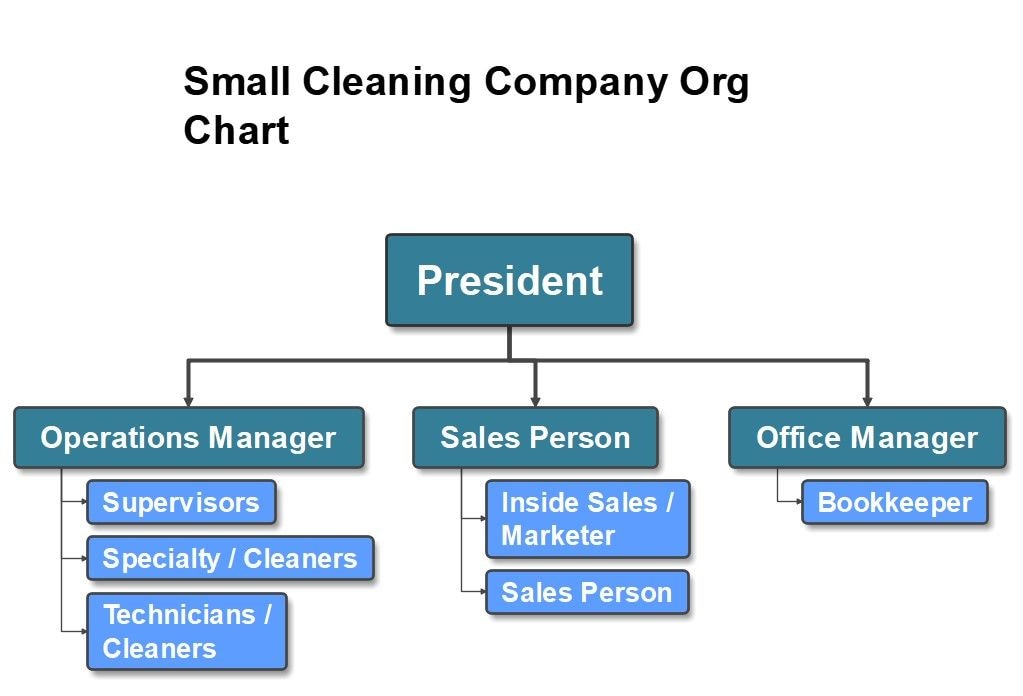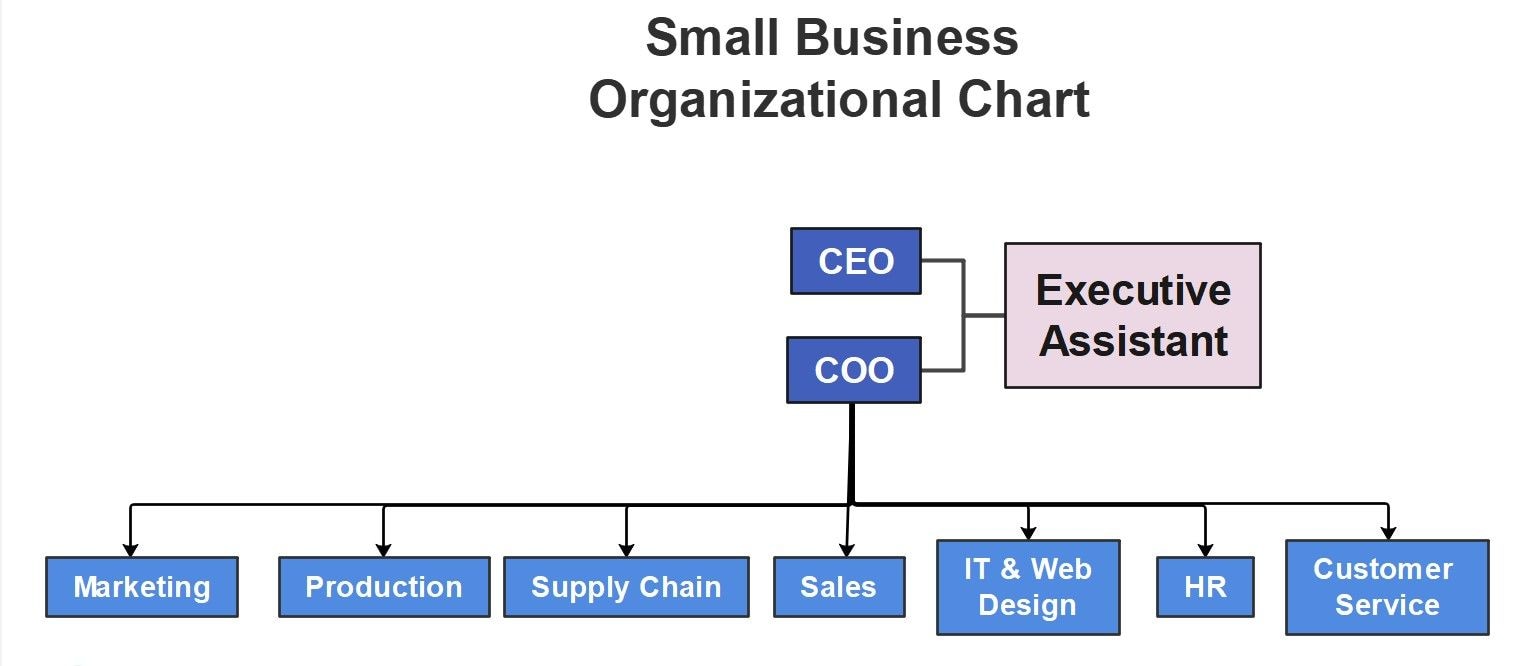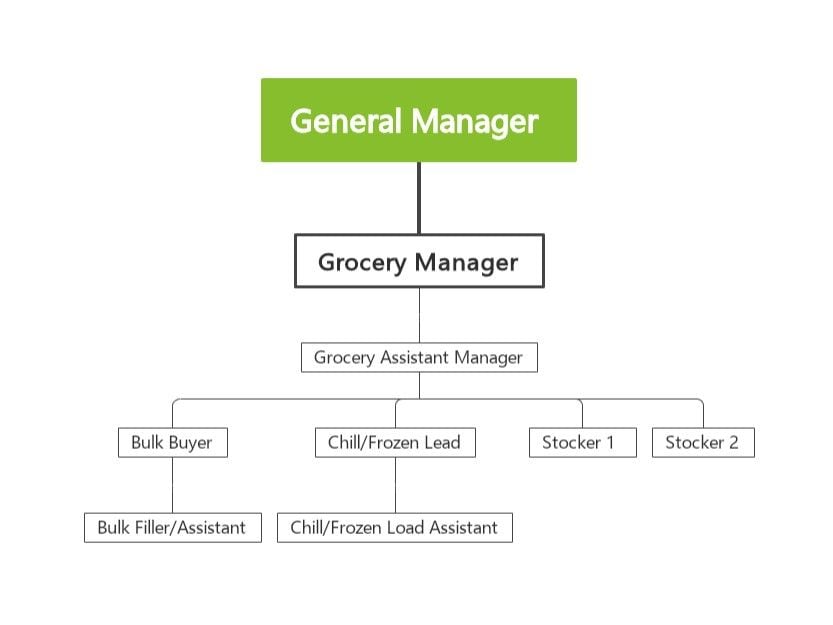
A small company needs a clear structure like a big corporation. Your employees need to know their positions and supervisors or managers. They can work with order and accuracy. When they have troubles, they know whom to find.
Without a clear company structure, management will be in a mess. Managers assign missions to employees at will instead of following company standards. Unfairness happens.
To avoid bad effects and ensure the best motivation to grow big, let's make a company structure for your small business! Hopefully, it will grow big with the guidance of a clear and effective company structure.
In this article
Part 1: What Is an Organizational Chart for Small Businesses?
An organizational chart for small businesses illustrates how the company operates. It's the visual presentation of your company structure.
It's a chart or diagram that uses shapes and lines to show the company hierarchy and the employees' roles.
Why Is the Organizational Chart Important for a Small Business?
Small businesses have advantages over large companies, such as a close-knit team, faster decision-making, and personalized customer service.
Despite these, a high-quality organizational chart helps a small or a startup company to win big.

- Clarity and Structure: While small businesses have a close team, an organizational chart provides clarity and structure. It shows who does what, avoiding any confusion about roles and responsibilities.
- Leveraging Team Strength: Small businesses rely on each team member's strengths for success. The organizational chart helps managers spot these strengths and assign tasks, maximizing the team's abilities.
- Streamlined Communication: Small businesses often need to make quick decisions to adapt to changes in the market. An org chart for small businesses helps communication flow, ensuring that ideas and information reach the right people.
- Growth and Expansion: Small businesses might hire more people or create new departments when they grow. The organizational chart helps show how these new roles fit into the company structure, making expansion smooth and clear.
- Enhanced Efficiency: Small businesses have limited resources. They need to be efficient. An organizational chart helps find where more help is needed, avoid waste, and use resources wisely.
- Improved Decision-Making: In small businesses, quick decision-making is important. The organizational chart helps make decisions involving the right team members, leading to better choices.
Part 2: Organizational Chart Templates for Small Business
Now that you see how important organizational charts are for small businesses, you know they bring order and clarity. Small businesses, like big ones, can struggle when things get messy. Without a plan, important tasks might be missed. If you're unsure how to start, check out these templates below.
Small Real Estate Company Organizational Chart
Let's take the template of a small real estate business.
- The owner is at the top and handles two main departments: Office Management and Marketing.
- The office manager oversees accounts receivable, accounts payable, and payroll.
- A few staff members are handling all these functions.
- Also, an office assistant helps the office manager and transactions.
- The chart also includes shapes for several agents who work for the company.
With this small company organizational chart, everyone knows their roles. The owner oversees everything, the office manager and transactions team handle money matters, and the agents focus on sales. If anyone has a question or concern, they know who to talk to, which helps the team work together better.
2. Small Cleaning Company Org Chart
Now, look at another org chart for small businesses.
- At the top, you'll see the president.
- Below, three managers oversee areas: Operations, Sales, and the Office.
- The operations manager takes care of supervisors, specialty cleaners, and technicians.
In this organizational chart, you can see that one person does both Inside Sales and Marketing. They report to the salesperson. It helps divide responsibilities well, so everyone knows what to do, and nothing gets overlooked.
3. Matrix Organizational Chart for Small Business
In certain small businesses, there are several bosses. They have more people to manage, making the structure flatter with shorter command chains.
In this example, the CEO is on top.
The COO reposts to the CEO. There's also a hanging box for the executive assistant, who supports the top managers. The COO handles several departments, such as Marketing, Production, Supply Chain, and more.
This org chart for small businesses works well for their teams, making it easier to communicate and make decisions.
Drawing organizational charts by hand takes a long time and is hard to change. Also, Word and PowerPoint are not designed for creating complex organizational charts. Check out this software below to make a small company organizational chart.
Part 3: Wondershare EdrawMind: A Tool To Make Matrix Organizational Chart Creation Easier
Wondershare EdrawMind is a simple tool with an infinite canvas for creating an organizational chart for small businesses.
It has ready-to-use blank templates and a wide range of pre-designed org chart templates. Try it for free on various devices, including Mac, Windows, Android, and iOS. You can also use EdrawMind online.
- Easy to Use: EdrawMind has an intuitive and appealing interface. You can drag and drop elements to create an organizational chart for small businesses. It also allows easy import and export of files in multiple formats.
- Design and Customization Options: You can personalize the org chart for small businesses by adding company or brand colors, themes, images, and icons.
- Collaborative: No worries if your team is growing. EdrawMind's canvas has plenty of room for everyone, ensuring no important details get left out.

Steps To Make an Organizational Chart for Small Business
Follow these steps to create an org chart showing how your small business works. Design an organizational chart for small businesses for better understanding.
Step 1:
Go to the official website of Wondershare EdrawMind and click Free Download to get the app on your desktop. Install and launch the EdrawMind app.
Step 2:
Click Org Chart from the Blank Templates section. Alternatively, you can use a pre-designed template from the Local Examples below the blank templates.
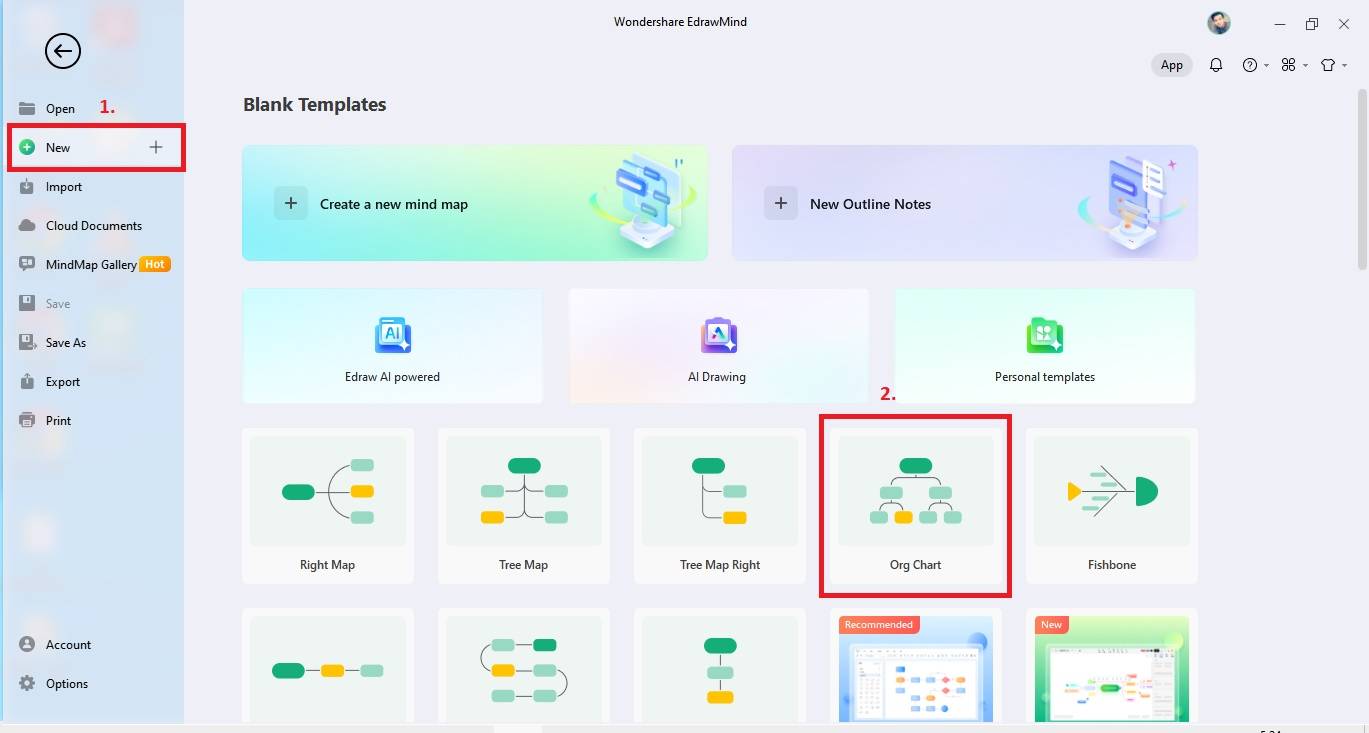
Step 3:
Customize the organizational chart for small businesses.
Add Shapes: From Home, click Topic or Subtopic in the upper navigation pane. Drag and drop the new shape where you want it on the canvas.
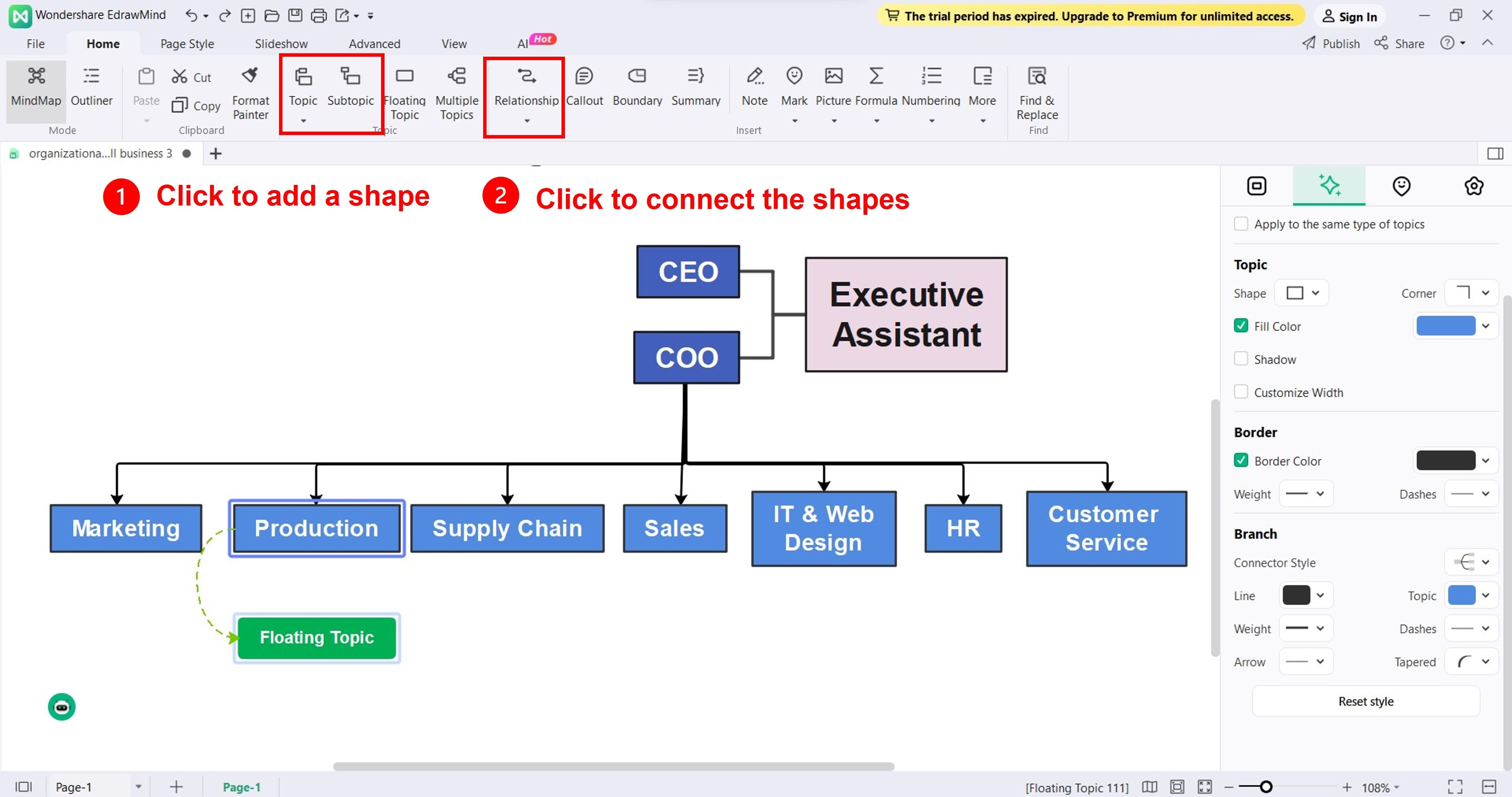
Connect the Shapes: Click the existing shape (example: Production) you want to link to the new shape. Go to Home > Relationship drop-down menu. Select Relationship (straight line) and click the new shape (example: Floating Topic).
Change the Theme: Go to the Map tab bar in the right panel, scroll down, and click the Theme drop-down menu. You can choose between light and dark themes.
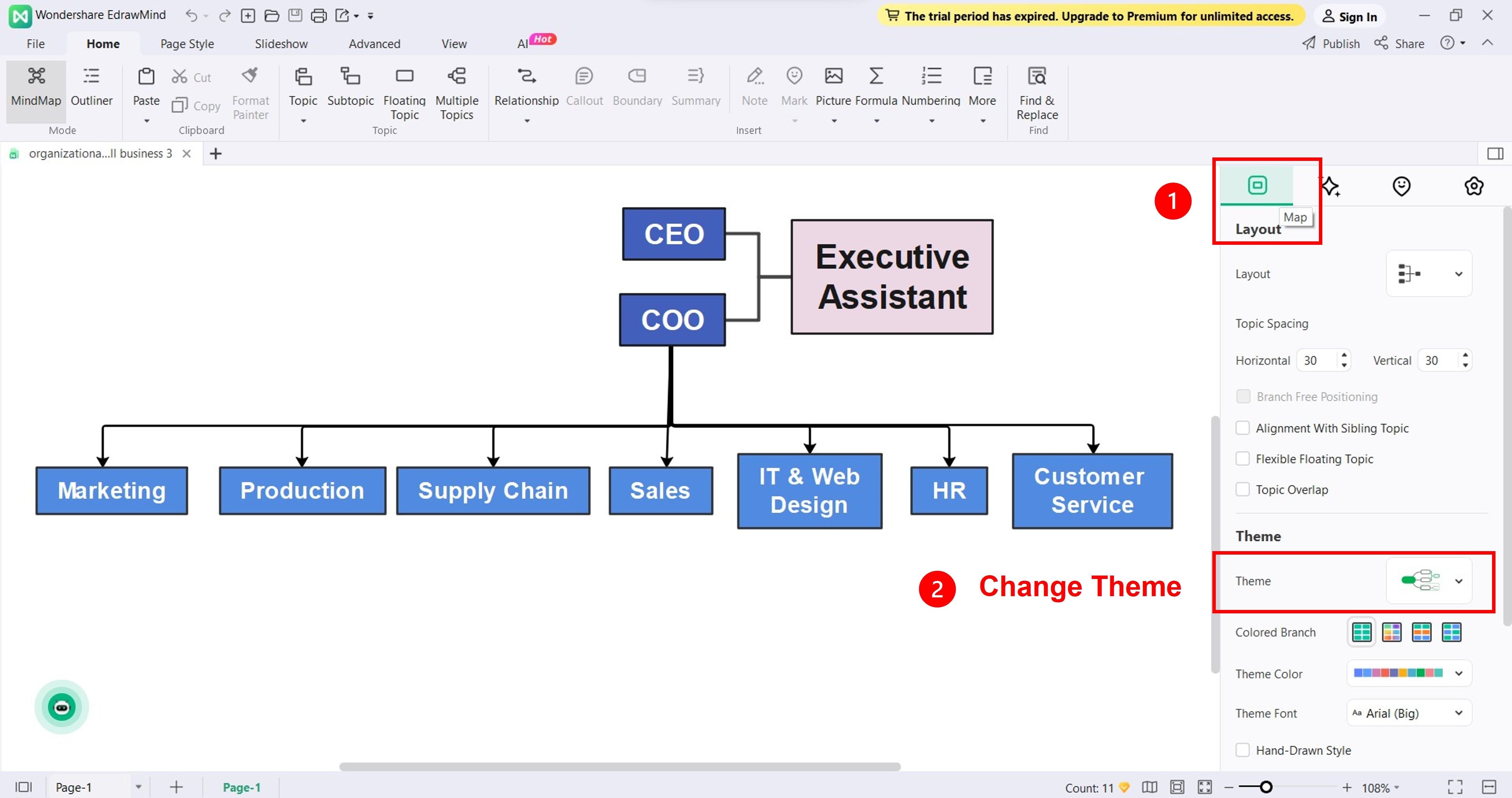
Insert Images or Icons: Go to Home > Picture drop-down menu and select Picture to upload from your local storage. Alternatively, select the Professions tag suggestion from the Clipart tab bar in the right pane.
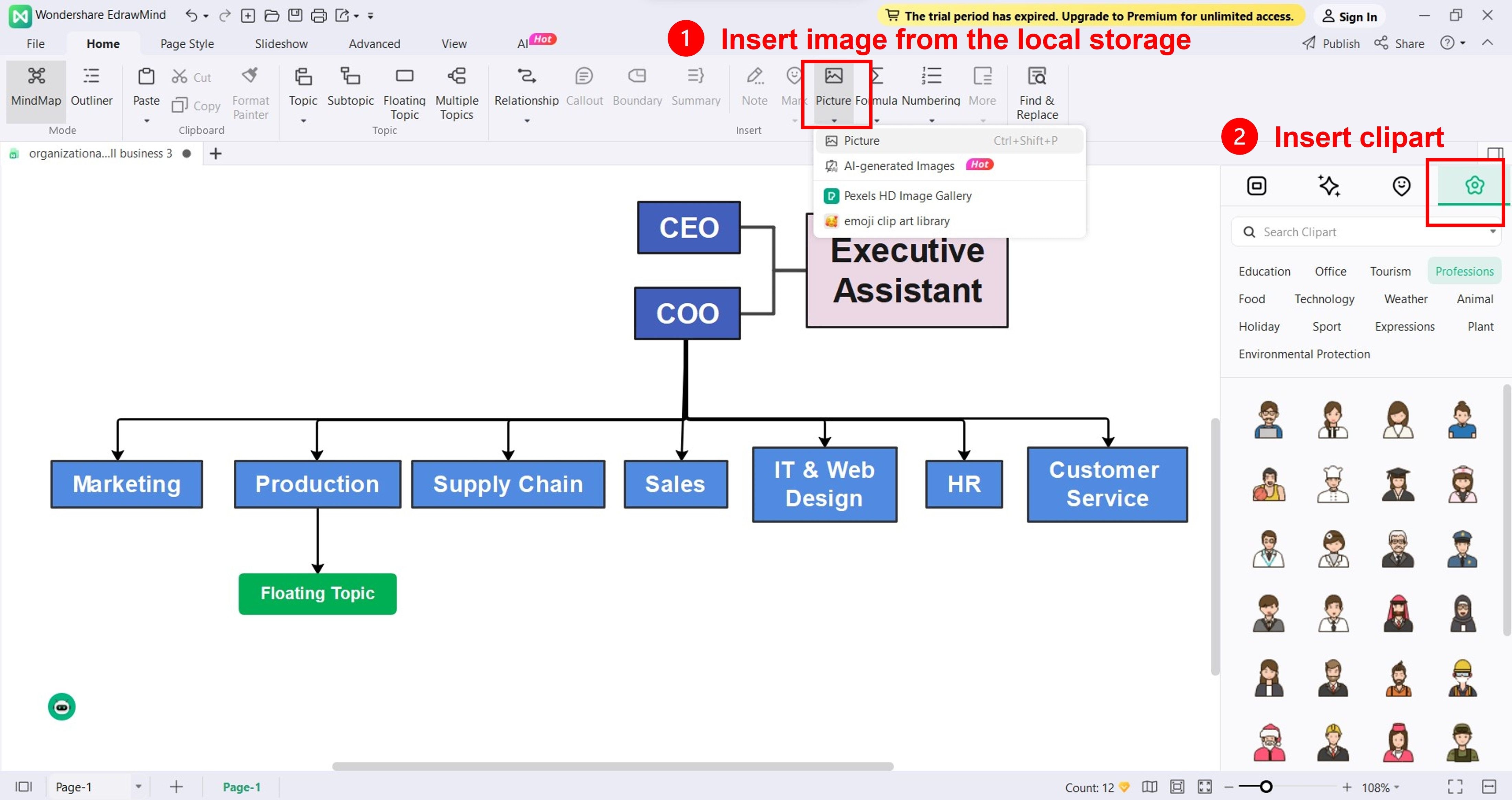
Step 4:
Once the org chart is ready, go to File in the upper navigation pane, then click Export from the left side navigation pane.
Types of Organizational Charts for Small Business
Now you've learned how to create an organizational chart for small businesses. This section will teach you the different types. Each type suits several business structures, so picking the right one is essential. Check out the following to find the perfect match that suits your small business best.
Hierarchical Organizational Chart
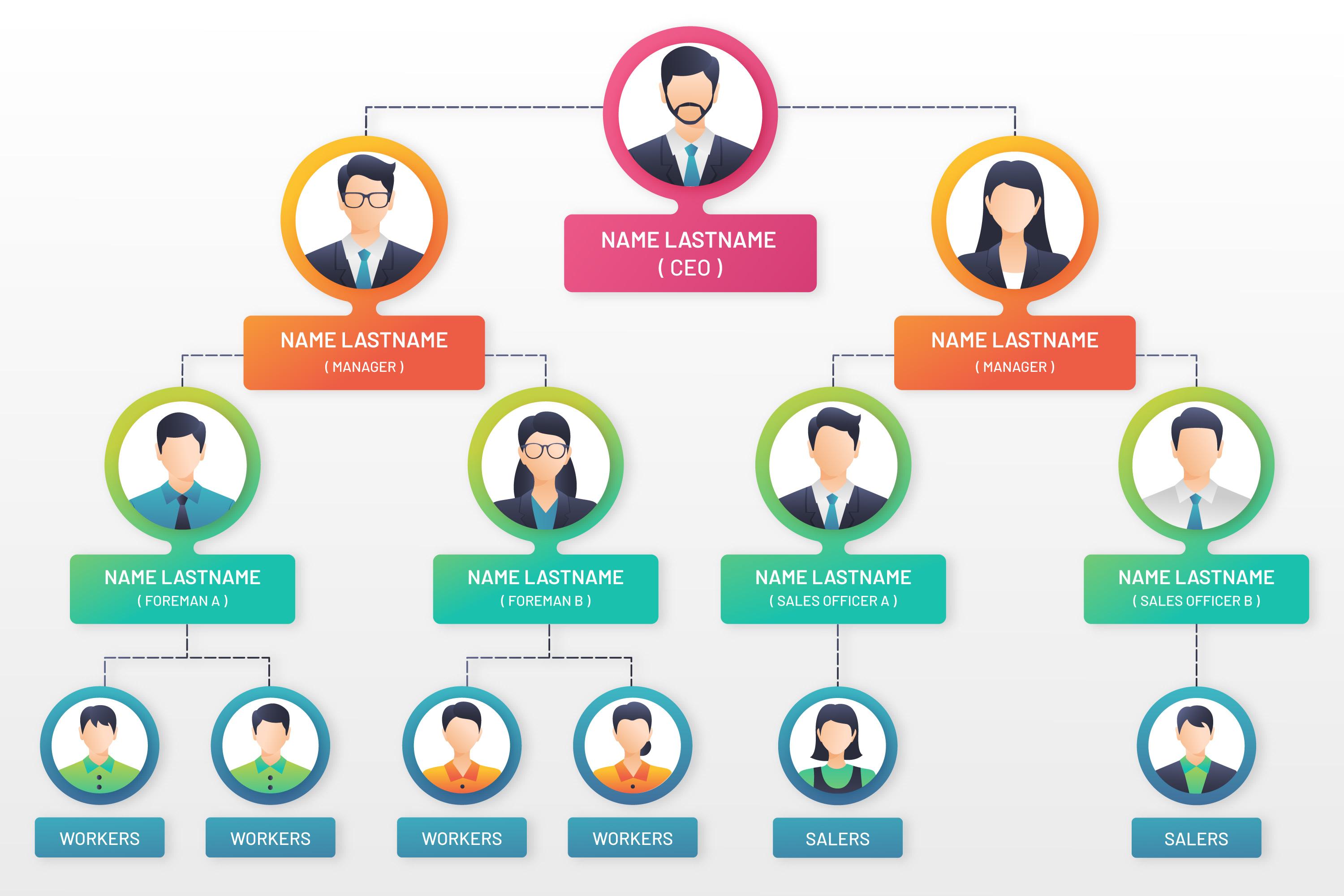
This type of org chart shows the top management at the peak, the managers, and the employees at the bottom. Top-level management shares information that cascades down the chain. A hierarchical org chart is a straightforward and easy-to-understand structure. It's perfect for small businesses with clear levels of command.
Flat Organizational Chart
In a flat org chart, there are fewer levels of management, and everyone is closer to the top. It's perfect for small businesses with a close-knit team. Communication is quick and efficient since there are fewer layers to go through.
Functional Organizational Chart
This org chart groups employees based on their skills or departments like marketing, finance, or operations. It helps show the different areas of expertise within the company. This organizational chart for small businesses is helpful when teams work together. For example, the marketing team collaborates with the sales team to boost business.
Matrix Organizational Chart
Employees belong to both a functional group and a project team. It's suitable for small businesses that work on various projects with cross-functional teams.
Remember, the type of org chart you choose should match your small business's style and structure. So look at these options and find the perfect match to help your business thrive.
Part 5. Tips for Creating an Effective Organizational Chart for a Small Business
Creating an organizational chart for your small business can be helpful. Here are some tips to make it the best it can be:
1. Flexibility Is Key
Remember, small businesses can change and grow. So, make the org chart flexible and easy to update when new people join, or roles change. Leave space to add more people and new departments.
2. Define Roles Clearly
Each person in your small company should know their job and who they report to. With a clear org chart, everyone can see their role and responsibilities. Use different font sizes or bold text to show the hierarchy and levels of management in your small business.
3. Keep It Simple and Clear
Make your chart easy to understand. Stick to basic shapes like rectangles or circles for the positions in your chart. Avoid too many complicated details. Avoid overcrowding with too much information in one place.
4. Use Colors Wisely
Adding color to the organizational chart can make it more visually appealing. Use colors to group similar roles or departments.
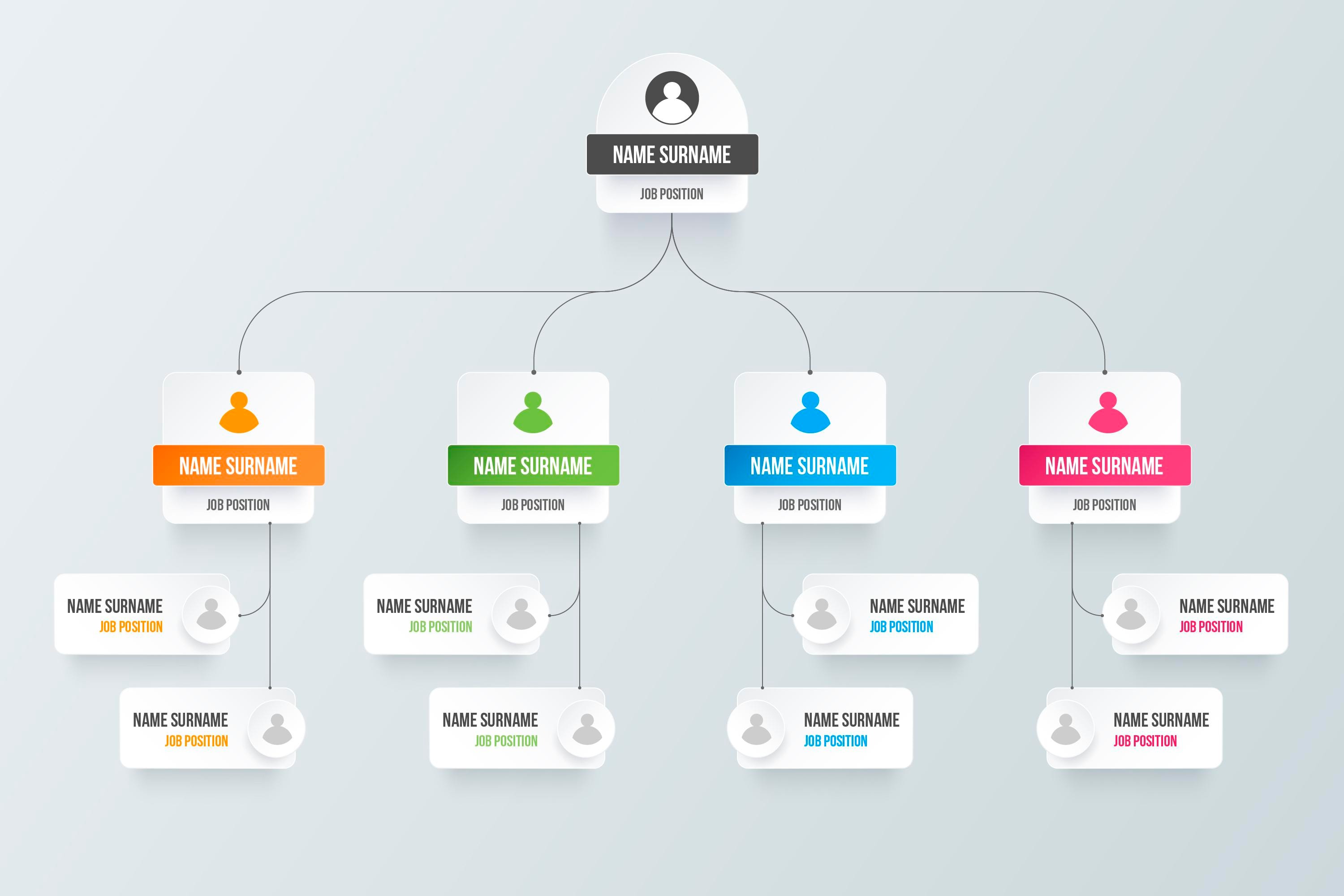
5. Include Photos
Adding photos of your team members beside their names can make the chart friendlier and help everyone recognize each other better.
Conclusion
The best organizational chart for small businesses depends on their current structure. Make it simple and clear, whether it's hierarchical or functional. For an easy and powerful tool to create org charts, try EdrawMind. With it, you can make an organizational chart that keeps everyone on the same page and helps your team work smoothly.



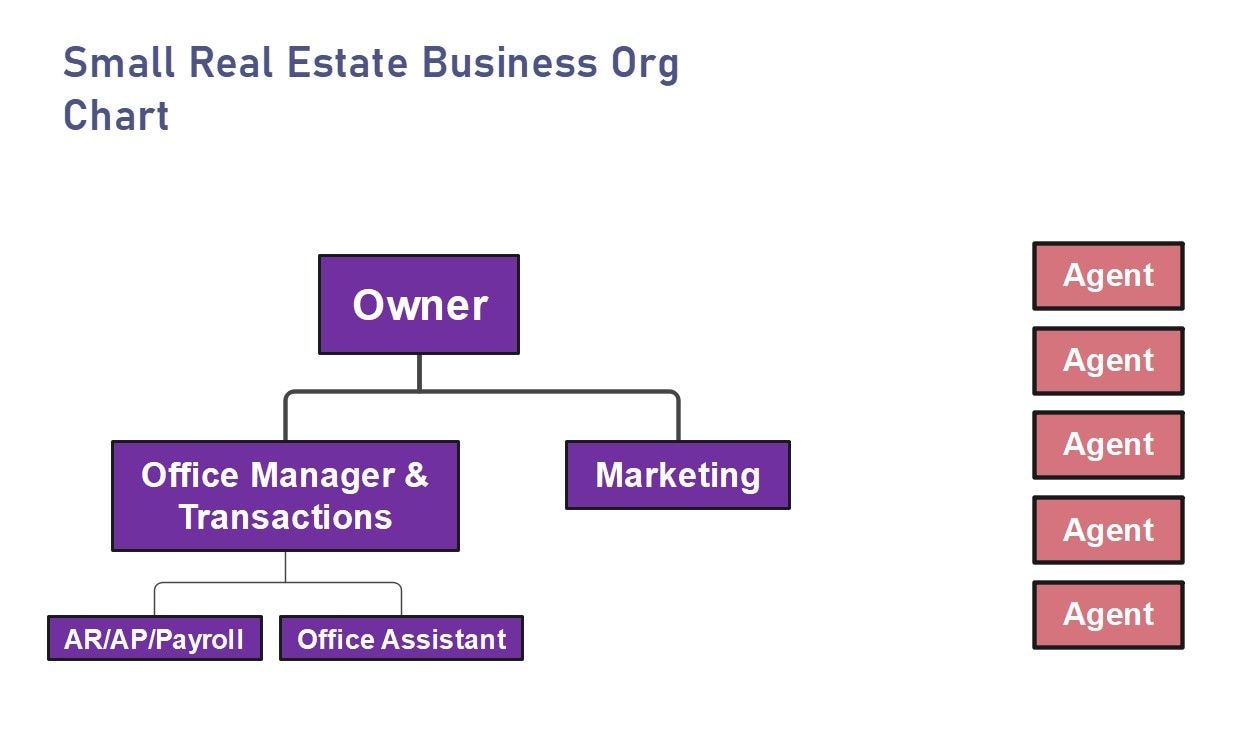
 below.
below.  below.
below. 